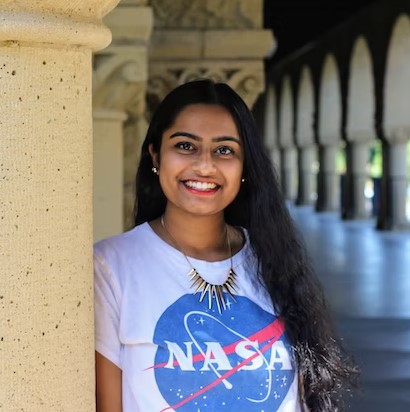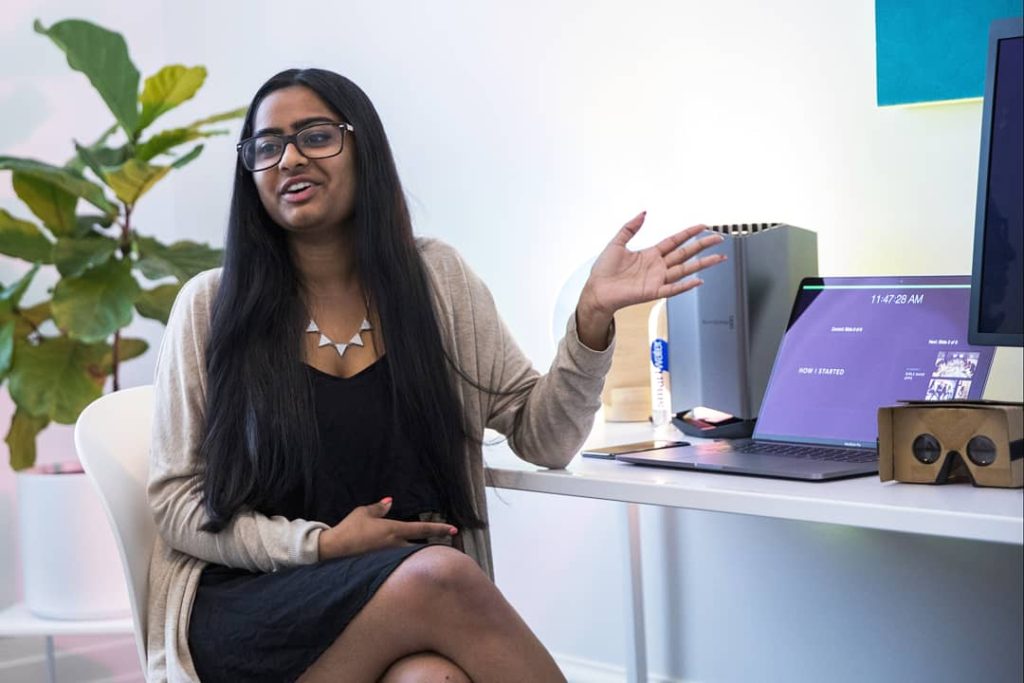(July 15, 2023) Akshaya Dinesh fell in love with coding through hackathons. The 24-year-old began her entrepreneurship journey during her time at Stanford University, and is the founder of two startups – Ladder and Spellbound. She went on leave of absence from university and gave up a paid internship at Facebook to concentrate on her entrepreneurial journey, where she felt she would make the biggest impact. Her work mainly involves empowering girls in tech, encouraging them to break stereotypes and helping them gain access to opportunities, training and resources.
Growing up in New Jersey, Akshaya began dabbling in coding in early high school, more out of boredom than passion. “The summer between middle and high school, I just was super bored and had nothing to do. My parents encouraged me to try to learn a new field.” Her parents had seen the opportunities out there for programmers and told Akshaya to learn Java. “I unwillingly learned Java and hated it,” the Global Indian said in an interview. “The first language I learned after Java was JavaScript because I realised Java wasn’t enough for me to actually build anything of use.”
How hackathons changed her life
Her big turning point came when she discovered hackathons, which happened almost by chance. “I was a math competition for my high school math team and I saw a Major League Hackathon sticker on someone’s computer,” she recalled, in a podcast. She went home and looked it up, only to find “this whole world I knew nothing about.” There happened to be a hackathon coming up in New Jersey and she signed up. Her mother drove her to the event and Akshaya walked in to “a sea of white and Asian boys, pretty much.” Clearly, there were very few girls in tech and not much was being done to increase diversity in the space. The spectacle was so daunting she wanted to turn around and go home. To her relief, she found a table of girls and gravitated towards them. “We spent that weekend working on a website together. We were total newbies and didn’t win anything, but I was translating the code to Javascript. I loved the entire idea of being able to build a product from scratch in 24 hours,” she said.

Akshaya Dinesh, the entrepreneur working to empower girls in tech
Just like that, Akshaya was hooked. She would travel to hackathons every weekend, has attended more than 45 and won a couple of the big ones too. Enthused by her successes, Akshaya attempted to join the Robotics team at her high school. “The male programming lead was so unsupportive, he screamed at me to leave the room. I went home and cried to my mom, wondering what I had done wrong,” Akshaya said. She learned later that many people had complained against the young man in question, and it spurred Akshaya to do something about it.
Akshaya decided to launch a diversity initiative within the school. She recruited a few of her peers and over the next few years, the team had organised two hackathons and coding and entrepreneurship training to girls of all ages across the country. “Over 600 girls have been taught by our curriculum,” she said. Her big lesson from the experience was that anyone can be an entrepreneur, given the right resources and opportunities. “One group of sixth graders who attended our camp, came from a relatively low income area of New Jersey. They had no coding experience. By the end of our eight-week bootcamp, they had created an Android app from scratch, which they pitched in English to the entire audience.” The app was meant to teach ESL students how to speak English. “It’s amazing to see how quickly people can grow if they are in a supportive environment,” Akshaya says.
Akshaya’s own accolades earned her a spot in Stanford University’s prestigious CS programme. Her involvement with She++, a social enterprise that works to empower underrepresented groups in technology, helped her land two big internships before college, one at Microsoft and the other at Bloomberg, before she began university. “It was my first time getting to experience Silicon Valley and being in huge tech companies that I had never dreamed of visiting,” she explains.
At Stanford University, Akshaya taught two classes – Introduction to Programming and Data structures. She also continued her involvement with She ++, through which she had wonderful experiences. “I wanted to give back and make that experience possible for other women,” she said. So, she ran the college version of the Ambassadors programme, although the summit itself was cancelled due to the pandemic. Stanford University provided her with a rich ecosystem to learn and grow, and the CS programme was the right place to be. “It caters perfectly to tech and tech entrepreneurship learning,” she said.


Akshaya Dinesh
Up the social entrepreneurship ‘Ladder’
At Stanford, she began brainstorming with a friend who was doing a CS Master’s. The pandemic was at its peak then and thousands of people were struggling to find replacements for cancelled internships. The duo put a simple plan in place – matching students with mentors in their field of interest and having coffee chats with them. “That became huge quickly,” she said. Lots of people signed up and it was clear they had filled a growing need. This was how Ladder came to be, a community for people in tech to meet, network and help each other grow through collaboration.
“We had a huge list of internships that had come to us at Stanford University,” says Akshaya. They put those in the public domain and thousands of students began picking them. She realised that people simply don’t have access to the wealth of information and opportunities that she had at an Ivy League university. The Ladder newsletter was gaining traction fast – with 30,000 subscribers in the first month. “We could see there was a problem and wanted to work on it full-time to democratise access to opportunities,” she said.
The young entrepreneur was at another crossroads. She had an internship at Facebook lined up, and a CS course awaiting her at Stanford. However, she had also managed to raise funding for Ladder, which gave her the financial freedom to quit her summer job. She also went on leave of absence from her course at university. She recruited a couple of students to help her and the platform was ready in the next two weeks. As her startup grew, she knew more than ever that she didn’t want to work in a big-tech company any longer. Working with girls in tech allowed her to see the impact she was making. “I am an impact-oriented person and I wanted a certain kind of gratification that just isn’t there at a big-tech company,” she says. “With my startup, though, I can build a feature and see people using it in a week. I want a shorter feedback loop.”


Akshaya Dinesh
Challenges
“I realised that the most successful founders have an insane amount of confidence in themselves, their story and the product that they’re building,” Akshaya explains. As for herself, she often struggled with ‘Imposter Syndrome’, and to speak confidently to people. It was also intimidating to be in a male-dominated world, where female founders even struggle for funding. She tells her fellow female founder friend’s one thing: “When you enter a pitch meeting, assume that you’re a white male and you have all the same privileges,” she remarks. It’s part of empowering girls in tech as they struggle in a male-dominated, sometimes unwelcoming environment.
Akshaya Dinesh is also the founder of Spellbound, which incorporates interactive user experiences embedded inside the body of emails. “My goal is to build an extremely successful large business and sort of prove to the world that you don’t need to be a white man to accomplish the same types of success,” she says.
Follow Akshaya on LinkedIn





Congrats Akshya…..!!
Raju Periyappa!
Congratulations aishwarya
Congratulation Akshaya. Great work of yours and your perseverance to achieve. Yes. Women do need empowerment. At 66, I too am keen to build up women force, even the oppressed. I’ve visited New Jersey..Will network across the globe with people like you especially an young and able torch bearer like you..Hats off to you. All the very best….Dr. Nimmu Vasanth ( your uncle Raju Barathy’s colleague in People’s Movement), Tamil Nadu, India